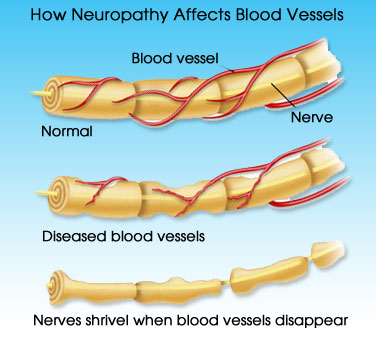peripheral Neuropathy
Peripheral Neuropathy

Peripheral Neuropathy is a term which encompasses disorders which result from damage to the nerves outside of the brain and spinal cord or peripheral nerves. This damage most often occurs in the hands and feet. The most common symptoms of this are burning, numbness, tingling, loss of sensation, weakness, or pain in the legs, feet, arms and hands. Although some cases can be inherited known as Hereditary Neuropathy, most cases are the result of damage to the small vessels of the body leading to damage to the nerves, known as Acquired Neuropathy. It is important to understand the possible cause of nerve damage, but in somes cases neuropathy can be considered idiopathic and have no discernible link between a causing factor.
When nerves are damaged, signals that they interpret can become skewed, such as intense pain without any sort of injury, or periodic numbness, and even a complete loss of sensation to some areas. This is especially concerning when it comes to the feet which can be injured without the protective sensation of pain.
Various diseases can make you more susceptible to developing neuropathy, such as vascular disease, endocrine disorders, cancer, smoking, sciatica, low back pain, and repetitive stress. Management of these conditions can help to limit further damage.
Treatment Options
When you are seen by your podiatrist, a simple and painless foot exam will reveal whether you have changes in the sensation of your feet. This helps to determine if there are areas with decreased sensation. From there, you can discuss options to help manage symptoms and discuss further testing such as nerve conduction studies or length dependent biopsies which can also be completed in office. Treatment is aimed at slowing the damage to the nerves and managing symptoms.
Treatments of Neuropathy:
- Foot soaks to alleviate pain
- Over the counter pain medication such as NSAIDs
- Regular gentle exercise such as walking, pool exercises, stretching, yoga, etc.
- Quitting smoking, decreased alcohol intake, management of blood sugars in diabetic patients
- Red light therapy or vibration plates
- Over the counter or prescription pain relief creams
- Vitamin B12 and Alpha-lipoic acid supplements
- Prescription medication such a Gabapentin, Pregabalin (Lyrica), Duloxetine (Cymbalta)
A resource for the community
Have any questions? Like to make an appointment? Call our office today!